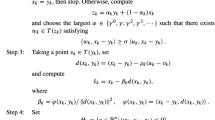Abstract
In this paper, we propose a projection based Newton-type algorithm for solving the variational inequality problems. A comprehensive study is conducted to analyze both global and local convergence properties of the algorithm. In particular, the algorithm is shown to be of superlinear convergence when the solution is a regular point. In addition, when the Jacobian matrix of the underlying function is positive definite at the solution or the solution is a non-degenerate point, the algorithm still possesses its superlinear convergence. Compared to the relevant projection algorithms in literature, the proposed algorithm is of remarkable advantages in terms of its generalization and favorable convergence properties under relaxed assumptions.
Similar content being viewed by others
References
Chua, C.B., Hien, L.T.K.: A suprlinearly convergent smoothing Newton continuation algorithm for variational inequalities over definable sets. SIAM J. Optim. 25, 1034–1063 (2015)
Daryina, A.N., Izmailov, A.F., Solodov, M.V.: A class of active-set Newton methods for mixed complementarity problems. SIAM J. Optim. 15, 409–429 (2004)
Dunn, J.C.: On the convergence of projected gradient processes to singular critical points. J. Optim. Theory Appl. 56, 203–216 (1987)
Facchinei, F., Soares, J.: A new merit function for nonlinear complementarity problem and a related algorithm. SIAM J. Optim. 7, 225–247 (1997)
Facchinei, F., Pang, J.S.: Finite-dimensional Variational Inequalities and Complementarity Problems. Springer, New York (2003)
Ferris, M.C., Pang, J.S.: Nondegenerate solutions and related concepts in affine variational inequalities. SIAM J. Control Optim. 34, 244–263 (1996)
Ge, Z.L., Ni, Q., Zhang, X.: A smoothing inexact Newton method for variational inequalities with nonlinear constraints. J. Inequal. Appl. (2017). https://doi.org/10.1186/s13660-017-1433-9
Harker, P., Pang, J.S.: Finite-dimensional variational inequality and nonlinear complementarity problems: a survey of theory, algorithms and applications. Math. Program. 48, 161–220 (1990)
Kanzow, C., Fukushima, M.: Theoretical and numerical investigation of the D-gap function for box conatrainted variational inequalities. Math. Program. 83, 55–87 (1998)
More, J.J.: Coercivity conditions in nonlinear complementarity problems. SIAM Review 16, 1–16 (1974)
Pang, J.S.: Inexact Newton methods for the nonlinear complementarity problem. Math. program. 36, 54–71 (1986)
Peng, J.M., Fukushima, M.: A hybrid Newton method for solving the varitational inequality problem via the D-gap function. Math. Program. 86, 367–386 (1999)
Qi, H.D.: A regularized smoothing Newton method for box constrained variational inequality problems with \({\rm P}_{{0}}\)-functions. SIAM J. Optim. 10, 315–330 (1999)
Qi, H.D., Liao, L.Z.: A smoothing Newton method for general nonlinear complementarity problems. Comput. Optim. Appl. 17, 231–253 (2000)
Qi, L.Q.: Boundedness and regularity properties of semismooth reformulations of variational inequalities. J. Glob. Optim. 35, 343–366 (2006)
Robinson, S.M.: Strongly regular generlized equations. Math. Oper. Res. 5, 43–62 (1980)
Schaible, S., Karmamardian, S., Crouzeix, J.-P.: Characteirizations of generalized monotone maps. J. Optim. Theory Appl. 76, 399–413 (1993)
Solodov, M.V.: A class of globally convergent algorithms for pseudomonotone variational inequalities, complementarity: applications, algorithms and extension. In: Ferrs, M. C., Mangasarian, O. L., Pang, J. S. (eds.) Applied Optimization, pp. 297–315. 50, Kluwer Academic Publishers, Dordrecht (2001)
Solodov, M.V., Svaiter, B.F.: A truly globally convergent Newton-type method for the monotone nonlinear complementarity problem. SIAM J. Optim. 10, 605–625 (2000)
Solodov, M.V., Svaiter, B.F.: A new proximal-based globalization strategy for the Josephy-Newton method for variational inequalities. Optim. Method Softw. 17, 965–983 (2002)
Sun, D.: A regularization Newton method for solving nonlinear complementarity problems. Appl. Math. Optim. 40, 315–339 (1999)
Sun, D., Womersley, R.S.: A new unconstrained differentiable merit function for box constrained variational inequality problems and a damped Gauss–Newton method. SIAM J. Optim. 9, 388–413 (1999)
Sun, D., Womersley, R.S., Qi, H.Q.: A feasible semismooth asymptotically Newton method for mixed complementarity problems. Math. Program. 94, 167–187 (2002)
Sun, D.: A class of iterative methods for solving nonlinear equations. J. Optim. Theory Appl. 91, 123–140 (1996)
Taji, K., Fukushima, M.: Optimization based globally convergent methods for the nonlinear complementarity problems. J. Oper. Res. Soc. Jpn. 37, 310–331 (1994)
Xiu, N.H., Zhang, J.Z.: Some rencent advances in projection-type methods for variational inequalities. J. Comput. Appl. Math. 152, 559–585 (2003)
Xiu, N.H., Wang, C.Y., Zhang, J.Z.: Convergence properties of projection and contraction methods for variational inequality problems. Appl. Math. Optim. 43, 147–168 (2001)
Yamashita, N., Fukushima, M.: The proximal point algorithm with genuine superlinear convergence for the monotone complemetarity problem. SIAM J. Optim. 11, 364–379 (2000)
Zarantonello, E.H.: Projections on convex sets in Hilbert space and spectral theory I and II. In: Zarantonello, E.H. (ed.) Contribution to Nonlinear Functional Analysis, pp. 237–424. Academic Press, New York (1971)
Acknowledgements
The authors thank the anonymous reviewers for the insightful and constructive comments and suggestions, which helped to improve the presentation of the paper.
Author information
Authors and Affiliations
Corresponding author
Additional information
Publisher's Note
Springer Nature remains neutral with regard to jurisdictional claims in published maps and institutional affiliations.
This project is supported by National Natural Science Foundation of China (No. 11271226), and the Natural Science Foundation of Shandong Province (No. ZR2018MA019).
Rights and permissions
About this article
Cite this article
Qu, B., Wang, C. & Meng, F. Convergence analysis of a projection algorithm for variational inequality problems. J Glob Optim 76, 433–452 (2020). https://doi.org/10.1007/s10898-019-00848-0
Received:
Accepted:
Published:
Issue Date:
DOI: https://doi.org/10.1007/s10898-019-00848-0



